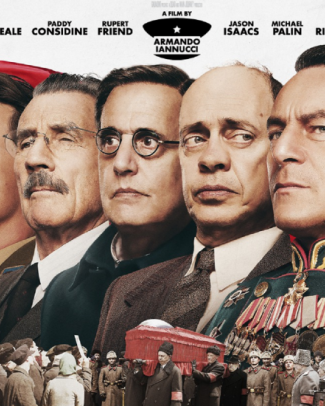Surprise hit of the week has to be The Death of Stalin. Although given the film’s cast, pedigree and subject matter, perhaps the most surprising aspect of its hitness is that that should be any sort of surprise at all.
The film tells the story of events following the death of dictator and monster, Joseph Vissarionovich Stalin (Adrian Mcloughlin). The spotlight is firmly on Stalin’s inner circle, and the gradually unfolding drama between leading players including Georgy Malenkov (Jeffrey Tambor), Lavrentiy Beria (Simon Russell Beale), Nikita Khruschev (Steve Buscemi), Anastas Mikoyan (Paul Whitehouse) and Nikolai Bulganin (Paul Chahidi).
As Russia gradually roused itself from the Terror that had been hallmark to the last years of his rule, those closest to him shook themselves awake: some took longer than others. There is a certain dreamlike quality to the first moments after his ministers find him, lying on the floor of his office, in a puddle of pee. Their first response: should we call a doctor - or should we await a quorum before taking such a momentous decision?
Some, like Beria - “let’s see who can mobilise first: seems to be me!” - get it instantly. For they are both victims of Stalin’s criminality and perpetrators of it. They understand – and therefore fear – their comrades all too well. Kruschev gets off to a slower start, but he, too, understands the seriousness of the stakes in play: “I’m the peacemaker and i’ll **** up anyone who gets in my way”.
Others, like eternal fence-sitter Malenkow - “when I said ‘no problem’ what I meant was ‘no….problem!” - and ideological worrier Molotov will never get it.
The film is fast-paced, witty and sharp. Almost every other line lands a punch, while the ending, a climactic power struggle taking place against the backdrop of Stalin’s funeral is both farcical and genuinely exciting.
Given the comic cast assembled, it is nigh impossible to single any out for especial praise. As the two most clearly engaged in slugging it out for the succession, Simon Beale/Beria and Steve Buscemi/Kruschev dominate the film. But when it comes to scene stealing, a special award must go to Hero of the Soviet Union and Head of the Army Georgy Zhukhov (Jason Isaacs). In a nod to Zhukov’s peasant origins, Isaacs plays him coarse and with a northern English accent: “what’s a war hero got to do to get some lubrication round here?”
And: “I’m off to represent the entire red army at the buffet: you girls [to the Central Committee] can enjoy yourselves!”
Runner-up, though, in the scene-stealing stakes is Rupert Friend, depicting Stalin’s son Vasily as variously deranged, drunk and psychotic. Very much a chip off the old block.
This disgraceful, irreverent, side-splittingly funny film is the sort of thing that happens when you let the comic genius of Armando Ianucci loose on the big screen. In fact, this is not his first big screen outing: however, write-ups that proceed seamlessly from TV hits such as The Thick of It and The Day Today, omitting lesser films such as Alan Partridge: Alpha Papa en route get it about right. Ianucci writes comedy gold: but his genius is most evident when, as here, shining a light into the dark corners of politics.
As director and lead writer Ianucci clearly deserves the lion’s share of the credit here: but let us not overlook co-writers David Schneider and Ian Martin.
Is it, though, in bad taste to make fun of such happenings. To include, for instance, as punchline for a joke, the last man to be executed before Stalin’s orders are rescinded? Or to carry on comic dialogue to a descant of prisoners being shot in the background?
It is clear from the few dissenting reviews of this film that some people do have issues with this, citing taste, respect for victims and….the usual suspects. I get it. After all, if you lost family members to the Terror, you may find it hard to distinguish comedy that laughs at the perpetrators from one that cheapens the suffering of the victims.
Still, I disagree: and I say that from the perspective of someone who did lose family as direct consequence of the rise of the Soviet Union. As it became unthinkable to say, publicly, what you genuinely felt – at risk of instant death or deportation – so a bleak, black humour emerged across the iron curtain. This was the only way to resist – and resist they did, as hundreds of thousands of people told jokes in the sure knowledge that one report, one overheard word could do for them.
In that sense, therefore, this film is not simply about the death of Stalin. Rather, it is a celebration of all those who never gave in: who survived those times and even, whisper it low, still found something to laugh at in the midst of awfulness.
Four and a half stars.


